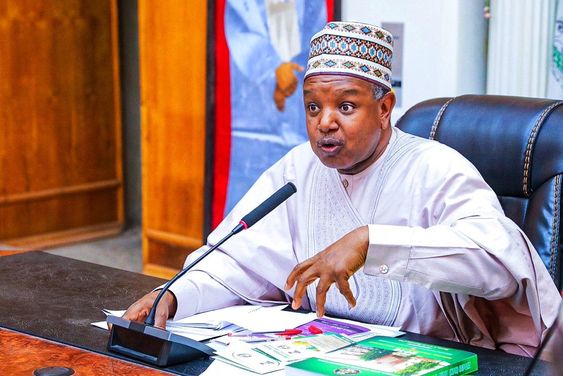Nigeria
The actual cause behind the increase in the 2024 Budget to N27.5trn – Atiku Bagudu

According to Atiku Bagudu, Minister of Budget and Economic Planning, the Federal Government raised its projection of the 2024 budget from N26 trillion to N27.5 trillion due to the prevailing economic conditions.
At the conclusion of the Federal Executive Council (FEC) meeting chaired by President Bola Tinubu at the Council Chamber of the Presidential Villa in Abuja, Bagudu revealed the information while providing the State House media with the most recent updates.
He stated that when the President formally presents the budget to the National Assembly in a few days, more information will be made available.
The National Assembly-passed MTEF and fiscal policy frameworks, according to Bagudu, were also subject to additional assessment.
He stated that the total amount is 27 trillion, 500 billion naira, an increase of more than 1.5 trillion over the prior estimate made with the outdated reference values.
The minister said that N18.2 trillion is the anticipated revenue for 2024, citing this as a reason for the increase from 2023.
The Federal Executive Council deliberated the 2024 Appropriations Bill, he declared. The National Assembly had previously approved the MTEF. Its benchmark price for crude oil is $73, and its exchange rate is N700 to the dollar.
“The council further evaluated the MTEF, using a benchmark price of $77 for crude oil and an exchange rate of N750 to the dollar, in an effort to increase revenue. Revenue will rise dramatically as a result.
He added that the council had also given its approval for the 2024 Appropriations Act and the President’s presentation of it to the National Assembly.
The Financial and Coordinating Minister of the Economy, Wale Edun, announced during his briefing that the FEC had approved a $1 billion loan from the African Development Bank (AfDB) to support the budget.
The Fiscal Policy and Tax Reform Committee provided a briefing, he stated. They have, in effect, been employed for around ninety days. They have been operating with such efficiency and effectiveness that they have even had an impact on the economy by proposing early reforms and pointing the way forward in terms of crucial goals.
In summary, they are the ones who came up with the policy to remove the VAT from diesel. They want to improve the government’s financial status by bringing in more money, especially through taxes, through digitalization, increased efficiency, and rationalisation of the current tax system.
“They want to raise the tax income to GDP ratio to 18%, which is the average for Africa; a lot of African countries are already above that level. Their goal is to reach 18% in a few years, which is approximately double where we are currently.
He added that the report has been warmly welcomed by the council and Mr. President, and that additional economic measures are being considered in the near future.
He continued by summarising the memos he had had approved during the meeting.
The $100 million in funding from the African Development Bank and the $15 million from the Canada-African Development Bank Climate Fund were the first items on the inherited finance and loan processing list.
It has essentially been inherited because it was processed prior to the current administration taking office. Essentially, Abia State is borrowing concessionally from the federal government at a rate of about 4.2% annually. Therefore, the money is to be given to Abia State, namely for waste management and road restoration in Umuahia and Aba. That was authorised,” he declared.
“Secondly, the financing of $1 billion, concessional financing with a 25-year, eight-year moratorium at roughly 4.2% annually, was authorised by the African Development Bank for this administration,” Edun went on.
“And actually, it was an acknowledgment of the macroeconomic actions that this government has made, including the quick steps towards macro stability, the restoration of revenue, the improvement of the foreign exchange situation, and so on. As far as the concessional finance institution African Development Bank was concerned, the prize was $1 billion in general budget support.
“Lastly, the Federal Executive Council approved a total limit of N2 trillion to be available for use by the Ministry of Finance to go in and out of the market and essentially to, where possible, bring down the rate of interest on the current outstanding. This will allow the government to continue working hard, maximise its ability to use the markets, take advantage of various situations, and improve situations.
“It will basically be refinancing, and the idea is that by repaying costly debt refinancing with less expensive funding, there will be a chance to save roughly N50 billion or more in debt servicing over time.”
